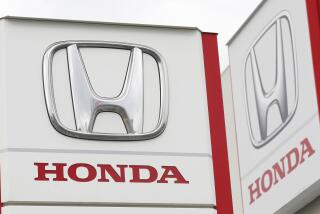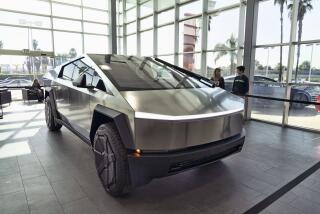Hyundai Rejects Recall After Losing $15-Million Suit
- Share via
FOUNTAIN VALLEY — Reacting swiftly to a jury’s decision to award $15 million to a child injured in a crash involving one of its cars, Hyundai Motor America said Tuesday that it has no plans to recall more than 92,000 of the 1987 and 1988 Excel subcompacts sold in the United States and equipped with passive restraint systems.
The company also said it plans an immediate appeal of Monday’s verdict by a Los Angeles County jury, which found that Hyundai was negligent for the design of the passive two-point seat-belt system used in some of the 527,000 1987 and 1988 Excels sold in the United States.
An attorney for 9-year-old Adam Ketchum of Lakewood urged the recall Monday after a Superior Court jury in Norwalk ruled that Hyundai’s seat-belt design contributed to the permanent brain damage and blindness sustained by the child in 1990 when the 1988 Excel in which he was a passenger slammed into the rear of an illegally parked truck.
Medical evidence showed that the boy’s shoulder belt cut off oxygen to his brain, causing anoxia.
Ketchum’s Mission Viejo attorney, Mark P. Robinson Jr., said the two-point seat-belt system, which does not use a lap belt, has been shown in crash tests to be harmful to shorter adults and was never tested with child-size dummies.
But Hyundai maintains that the two-point restraint system was approved by the federal government and that it did not contribute to the boy’s injuries. “Our defense will be that the seat belts are not defective, and the child’s injury was caused by deceleration forces of the car hitting a 60-ton truck at 48 miles per hour,” Hyundai spokeswoman Dottie Diemer said.
Hyundai Motor America, based in Fountain Valley, is the U.S. import and distribution arm of Hyundai Motor Corp. of South Korea. The company used federally approved two-point restraints in 10% of the 1987 Excels sold in this country and in 25% of the 1988 models before switching entirely to three-point systems, which incorporate lap belts, in 1989. The lap belts were added under a federal requirement for child restraint systems in the front seats of all cars sold in the United States after 1988. “The two-point shoulder system is a federally approved passive restraint system and was approved at the time we used it,” Diemer said. “We are not recalling the cars because the system is not defective.
“The 1988 Excel with the two-point belt scored among the top three of all vehicles tested by the federal government that year in a 35-miles-per-hour frontal impact crash test.”
During the trial, Hyundai said that Excels with the two-point system came with a warning that the shoulder belts could cause neck irritation to children and short adults.
Robinson argued, however, that the warning was confusing and inadequate. Other auto manufacturers that used two-point systems in the front seats specifically warned buyers not to use them with small children, he said.
The jury awarded Ketchum $13 million for lost earning potential and $2 million for pain and suffering.






